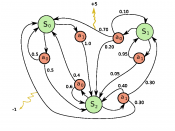Breach of Confidentiality:
The legal Implications when You are seeking Therapy
I. The need for confidentiality in therapy
A. Establish trust
B. A patients bill of rights
Thesis: The duty to warn has created an ethical dilemma for psychological professionals.
II. Therapists face a moral problem
B. Requirement by law to breach confidentiality
C. Exceptions for breaching confidentiality
D. Prediction of violence
E. Impact on client
I. The future outlook for therapy
A. Conflicting views between the legal and psychological professions
Breach of Confidentiality:
The legal Implications when You are seeking Therapy
People are afraid to admit to themselves and others that they need to help to resolve their psychological problems. This is due to the social stigma which society attaches to people, when they seek assistance from a mental health professional. Consequently it is very difficult for any person to establish a trusting relationship with their therapist, because they fear, that the therapist might reveal their most personal information and emotions to others.
Health professionals therefore created the patients bill of rights to install confidence between clients and therapists.
The patient has a right to every consideration of privacy concerning his own medical care program. Case discussion, consultation, examination, and treatment are confidential and should be conducted discreetly. Those not directly involved in his care must have the permission of the patient to be present. The patient has the right to expect that all communications and records pertaining to his care should be treated as confidential. ( Edge, 63 )
This bill of rights enables clients to disclose all personal information without fears. To fully confide in the therapist is essential to the success of the therapy. On the other hand, the therapist is legally obliged to breach this trust when necessary. The duty to warn has created an...


